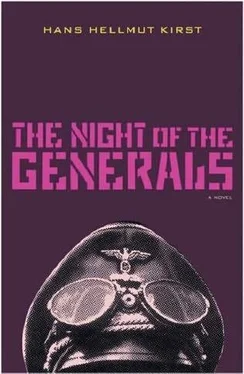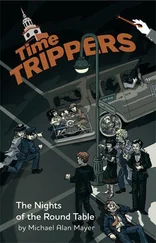“No one expects anything else of you.”
The G.O.C. slowly shook his imposing head, deaf to the still muted laughter that rippled round his table like water from a fountain playing at half strength. The joys of Parisian night-life had not yet reached their zenith. Von Seydlitz-Gabler sighed a little and drank a good deal, temporarily overcome by the feeling that there were hard times ahead.
Kahlenberge regarded the G.O.C. through narrowed eyes, savouring his agony of mind with unrestrained enjoyment. He had recently seized upon every opportunity to make disquieting allusions to an inevitable catastrophe which lay in the immediate future.
“Either tonight or tomorrow I shall be meeting a group of officers. I am convinced that their intentions are above reproach.”
“For heaven’s sake be careful, my dear chap!”
“Something positive must be done as soon as possible. What can I tell them about your own attitude?”
The G.O.C. was perspiring heavily, like a man in a Turkish bath and his ruddy features had taken on the sheen of wet varnish. “My sympathies,” he said, “are always with what is right and good.”
“Can you tell me what that means in practical terms?”
Kahlenberge’s question remained unanswered for the time being because a shadow had fallen across the table. It belonged not to Kraussnick but to Grau of the Abwehr—now Lieutenant-Colonel Grau. He bowed sedately. Far from diminishing, his innate self-assurance seemed to have increased with the years.
Kahlenberge looked annoyed. “Well, what are you doing here? I thought you spent your whole time chasing spies and traitors?”
“Why not here?” Grau inquired blandly.
General von Seydlitz-Gabler had straightened up in his chair. He looked forbidding. “Must you ruin our meagre ration of enjoyment?”
“As a matter of fact, General, I came to bring you some news which I thought might prove of interest. General Tanz is on his way to Paris.”
“Has he got another of his divisions cut to ribbons, then?” asked Kahlenberge bitterly.
“More or less,” Grau gave a smile of concurrence. “General Tanz’s division is to be quartered in the Versailles-Fontainebleau area for regrouping.”
“And you get a kick out of the idea?”
“It always gives me pleasure to look back on our instructive times together in Warsaw.”
On that note Lieutenant-Colonel Grau withdrew, strutting through the room—so it seemed to von Seydlitz-Gabler at least—like a peacock. He gave the impression of being on home ground wherever he went. Even the band, which had just struck up amusette waltz, seemed to match the rhythm of his stride.
The G.O.C. blinked at his Chief of Staff. “Surely he wouldn’t dare to bring up that Warsaw business all over again?”
“We only got as far as the first act.” Kahlenberge folded his hands Buddha-fashion. “The next act may prove superfluous if more important events intervene. I’ve no idea where the senior members of the Abwehr stand—whether our friends have won them over or whether Grau figures on their black list.”
“Let’s hope he does,” said the G.O.C.
“Be that as it may, do you sympathize with what these men are trying to do?”
The G.O.C.’s face darkened as though he were straining hard to hear some inner voice. “Perhaps. All the same, I don’t feel happy about it.”
Shortly afterwards Captain Kraussnick reappeared, bringing word of “various charming creatures,” well-developed and “anxious to please.”
The General shot Kahlenberge a reproachful sidelong glance. “I just don’t feel like it,” he grumbled with the air of a disgruntled Jupiter. “I’m not in the mood any more.”
The Mocambo Bar was packed. Inside, the temperature had risen to tropical heights. A saxophone howled its way up the scale, performed a few velvety somersaults and then plunged back, gurgling and choking, into the muddy depths of its lower register. Lance-Corporal Rainer Hartmann took his uniform jacket off.
“Why not your shirt too while you’re about it?” asked the girl beside him.
“Maybe later on,” said Hartmann, meaning it as a little joke, nothing more. He pulled the girl to her feet and prepared to push cheerfully through the packed dancers, but they stood aside for him.
Hartmann was saddened. He wanted to belong, to be just one of the pleasure-seeking crowd. The people around him were like himself—young, greedy for life, filled with a yearning for the scent and warmth of other bodies—but they avoided him. It was probably because he was wearing uniform, for almost all the other habitués of the Mocambo Bar were Frenchmen in civilian clothes.
“Something worrying you?” asked the girl he was dancing with.
Hartmann’s reaction was almost violent. “I’m happy,” he assured her. “I like it here. I come here often. I virtually discovered this place. Do you like it?”
“My name’s Ulrike.” The girl in his arms relaxed against him. “You’re welcome to call me Ulrike.”
“But do you like it here?” Hartmann asked hopefully.
“I like it because I’m here with you.” Ulrike’s lips were so close to his ear that he could almost feel them. “I’ve always wanted to be in a place like this—with you.”
Hartmann recoiled instinctively. Ulrike was the G.O.C.’s daughter and his friend Otto was under instructions to look after her, but Otto was hitting the bottle at the bar. His broad hindquarters and amorphous back were visible across the dance floor.
The next time Ulrike von Seydlitz-Gabler pressed her body gently against his, Hartmann did not recoil. It must have something to do with the atmosphere, he reflected. Just the attraction of the unfamiliar—a meaningless game, that was all, but yet another proof of how wonderful Paris was.
Everything Hartmann saw and heard pleased him: the sparse lighting with its soft gradations of red, the solid brick walls and the hypnotic beat of the drums, like the pulsing wing-beats of a flock of birds on the rise. He also liked the people who frequented this modest place of entertainment.
“Where can I wash my hands?” asked Ulrike when the music stopped.
Hartmann showed her. He was no stranger to the amenities of the Mocambo Bar—kitchen, bottle store, office and solitary toilet—all of them the size of a pocket handkerchief. He wandered over to the bar. Otto, his friend, companion and guide was there, and so was Raymonde. Raymonde meant Paris to Hartmann, even if it was the Paris of suburbs and back-yards, short-time hotels and Métro entrances.
Raymonde rinsed some glasses and smiled at him.
“You’re going great guns with Mademoiselle von Seydlitz-Gabler,” said Otto admiringly, his suety, pig-like face beaming. “But don’t go burning your fingers.”
Without waiting for Hartmann to ask, Raymonde put acrème de menthe frappée in front of him. Jealousy was alien to her, probably because she felt confident of her own special qualities. She didn’t regard Ulrike von Seydlitz-Gabler as competition, and lack of space did not prevent her from waggling her hips provocatively at Hartmann in the diminutive cubby-hole behind the bar counter.
“Why not hand Raymonde over to me for the night?” Otto suggested casually. “I’m sure Ulrike would make it up to you.”
“Are you speaking from experience?”
“Heaven forbid!” Otto sounded shocked. “I’m not tired of living. I leave that sort of caper to you.”
Rainer Hartmann felt a firm but gentle hand on his shoulder. It belonged to Ulrike. “Shall we dance again?” she asked.
He felt himself swept away by the music. The band was playing a blues—the Basin Street Blues—with a mixture of passion and attenuated melancholy. The extra-strongcrème de menthe, his seventh of the evening, hung about him like a heavy velvet curtain. His uniform jacket was draped limply over a chair somewhere.
Читать дальше












